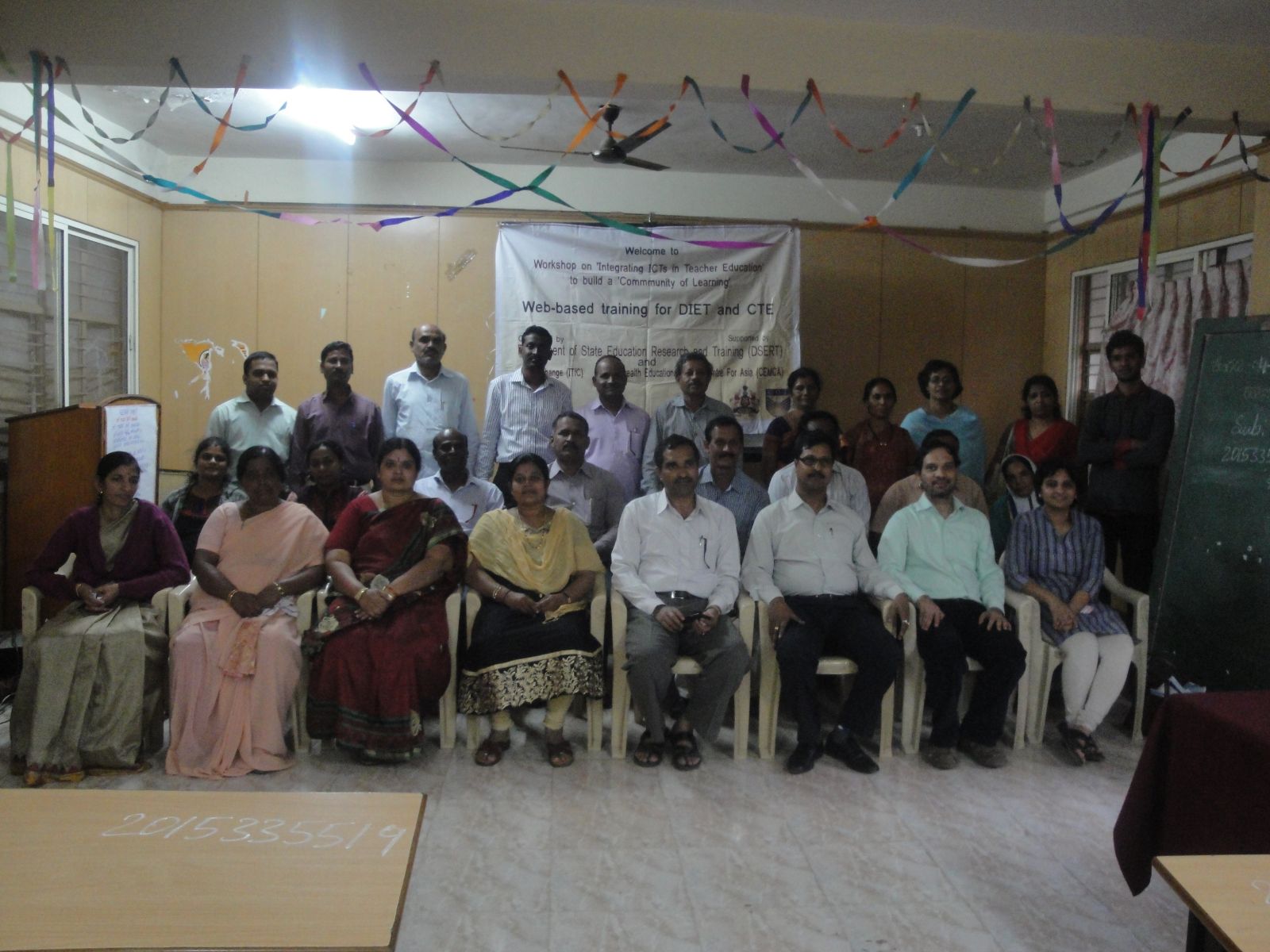Workshops on “ICT Integrated Teacher Education and Communities of Practice for Teacher Educators” for DIETs and CTEs of Karnataka

New Delhi; 01/02/2015: Commonwealth Educational Media Centre for Asia (CEMCA), New Delhi in collaboration with IT for Change (ITfC), Bangalore organised two workshops for the teacher educators from CTE (Colleges of Teacher Education) and District Institute of Education and Training (DIETs) in Karnataka. These were in line with the previous CEMCA engagements in Karnataka for building a strong Communities of Practice (CoP) for ICT integrated teacher education and intended to: build and strengthen teacher educators’ capacities to integrate ICTs into teacher-education, focusing on their professional development; and leveraging the CoP platform create an environment of collaboration; and assist teacher educators to develop and use digital libraries/OERs through a critical perspectives on technology and its use in education.
The 1st workshop was organised for teacher educators of Mathematics and Science subjects from January 20-24, 2015 at the Rural DIET, Bangalore and the 2nd workshop will be organised for teacher educators of Social Sciences and Languages subjects from February 3-7, 2015 at the Rural DIET, Bangalore. IT for Change has been serving as an implementing partner for CEMCA to liaise with the Department of State Educational Research and Training (DSERT), Karnataka and organise the training programmes.
In his inaugural address, Sri C.R. Rangadhamappa, Senior Assistant Director DSERT (Department of State Educational Research and Training) spoke about the revisions to the D.Ed. curriculum and syllabus and how the new curricula required ICT integration into the teaching of core subjects. The new syllabus also was in line with National Curriculum Framework (NCF) 2005 and made higher demands of teachers, in terms of a constructivist approach to transaction and a CCE (Continuous and Comprehensive Evaluation) approach to assessment. He requested the teacher educators to fully participate in the workshop and become confident in integrating ICTs in their work so that, as 'Master Resource Persons' (MRPs) they could effectively train their peer DIET faculty in divisional cascade workshops. CEMCA Programme Officer (Education), Dr. Manas Ranjan Panigrahi, welcomed the participants and spoke about the importance of ICTs in teacher education. He also presented the work of CEMCA in various areas including teacher education, higher education and open schooling. Mr. Gurumurthy Kasinathan, Director IT for Change, in his welcome address, mentioned that the “ICT Mediation in teaching learning” course in the revised D.Ed. Course was implemented where ICT was being integrated into the core teaching-learning processes for the D.Ed. course. The course would be transacted by the regular DIET faculty and not by computer faculty, covering educational applications in core subjects. It would also include critical perspectives on ICTs, and not simply treat ICTs as a panacea.
Over a period of five days, the 25 DIET faculty members covered various web tools; free educational software tools and components of basic computer literacy. They were introduced to the http://teacher-network.in/ COP platform for teacher educators and its features including access to resources, mailing groups etc. Educational tools such as Geogebra, PhET, Freemind and Record My Desktop were demonstrated. Teachers were also introduced to Karnataka Open Educational Resources (KOER) Wiki portal and the idea of collaborative resource creation. They also discussed the historical evolution of ICTs and the socio-cultural, political and economic implication of digital ICTs. The participants were organised into six teams and each team was given one part of the source book for the ICT mediation course and encouraged to review and revise the same, in the spirit of OER. The Director and other senior officers from DSERT also interacted with the workshop participants and provided their perspectives on ICT integration in teacher education.
Building the community of educators around a core content of teacher education will provide the context for continued interactions, through emails and through the wiki platform. They will discuss the “ICT Mediation in teaching learning” paper and the design and conduct of the divisional workshops, in which over 1,400 teacher educators are proposed to be trained. The expansion of the training to cover 1,400 teacher educators across the state is expected to support the growth of the COP.

